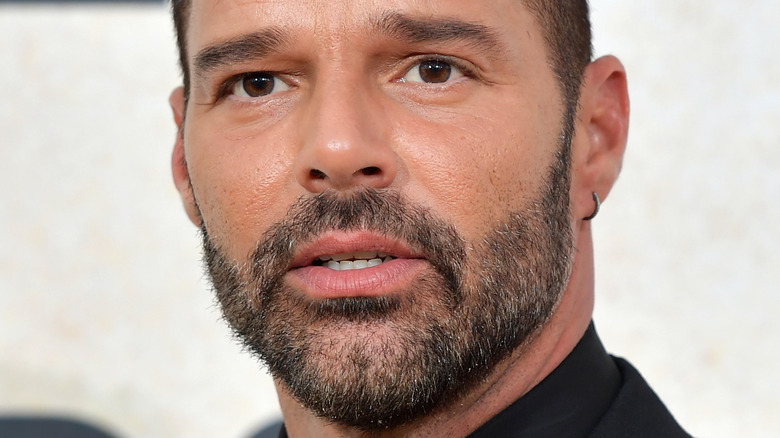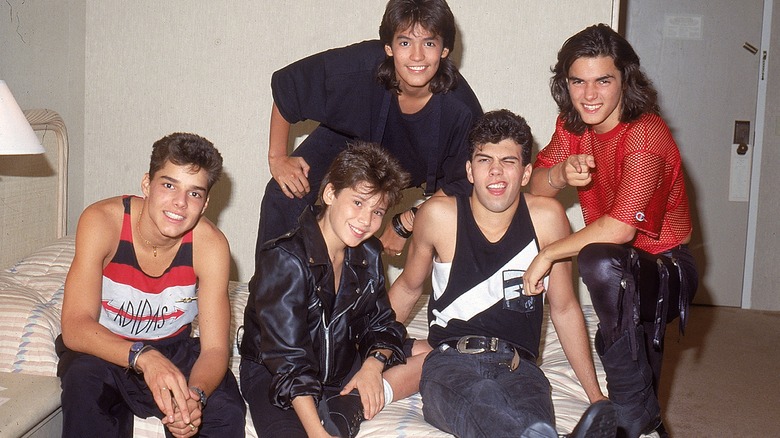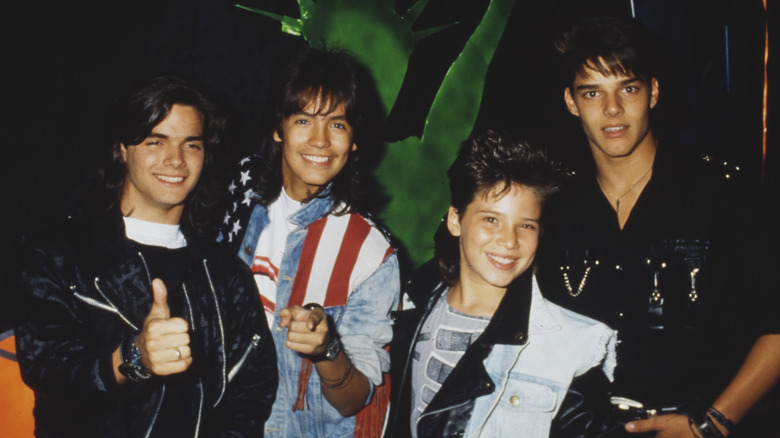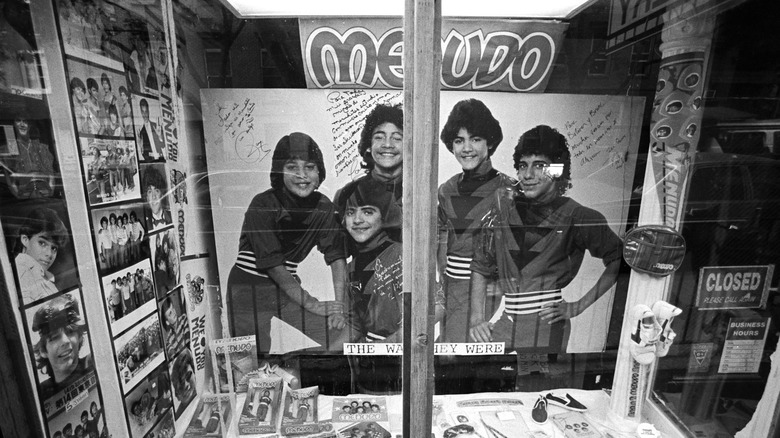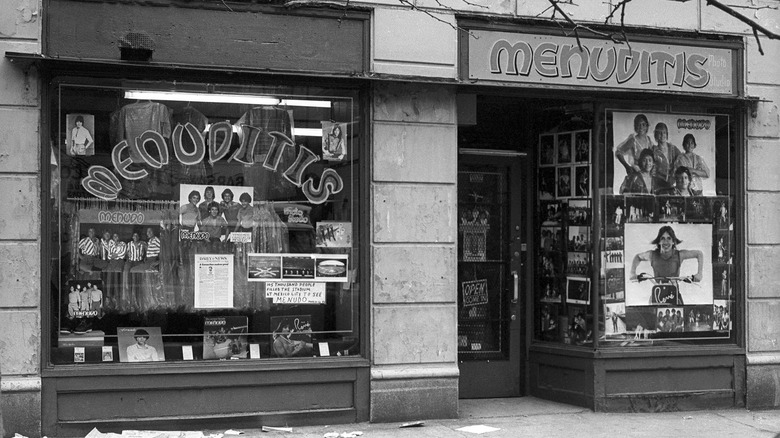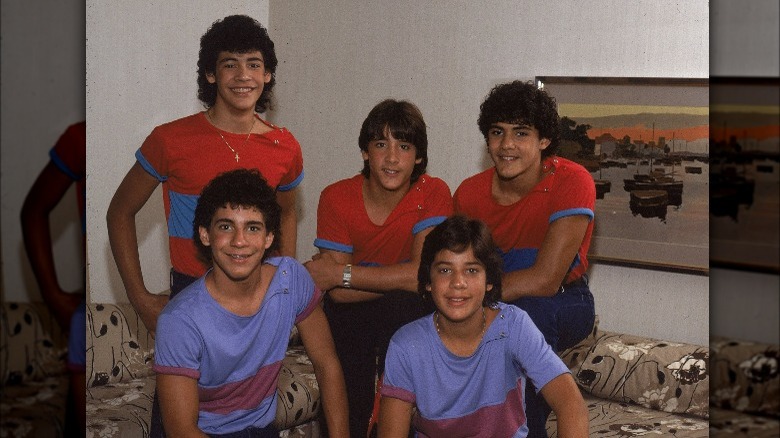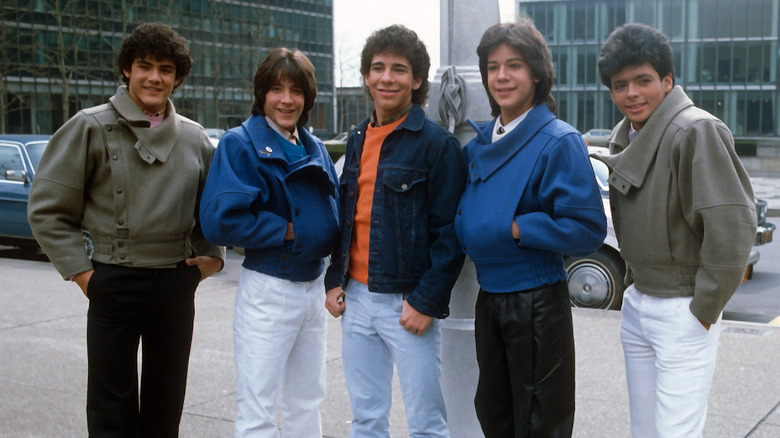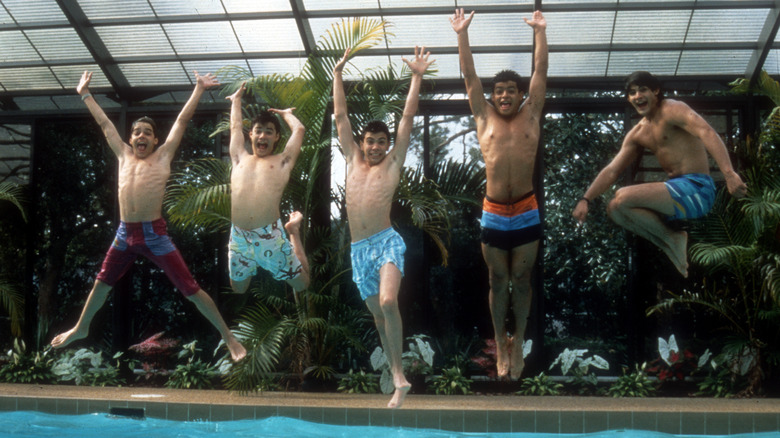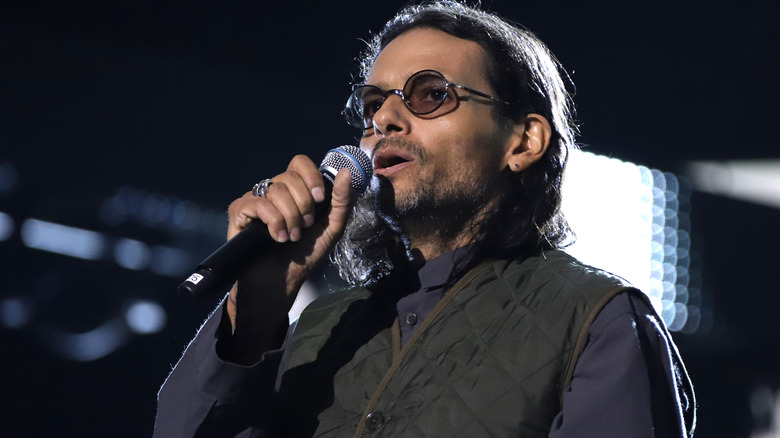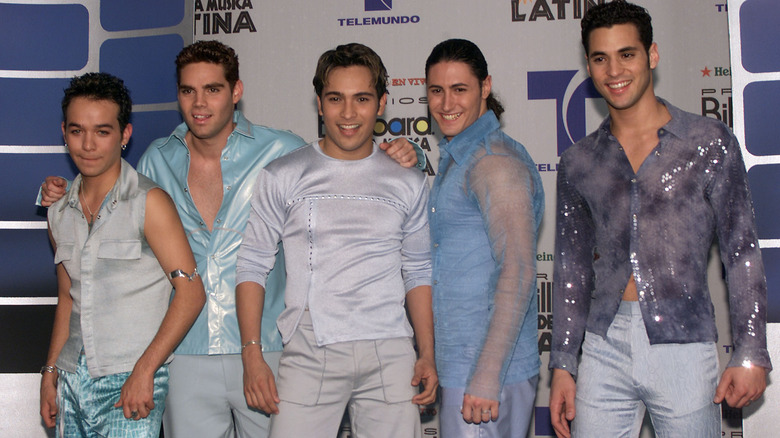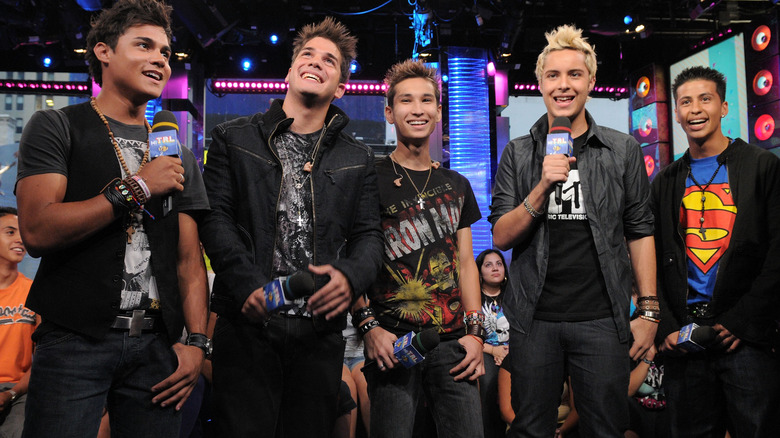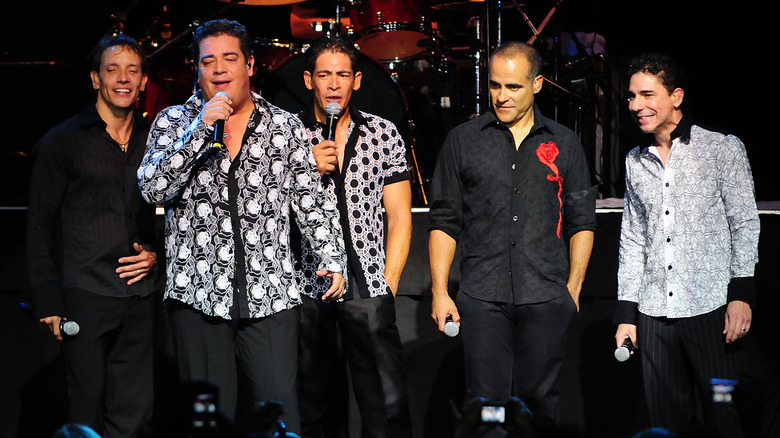The Untold Truth Of Menudo
We may receive a commission on purchases made from links.
This article contains allegations of sexual assault and child abuse and references to drug use and suicide.
From the very start, the Latin-American boy band, Menudo, was designed to be "Siempre Joven" (forever young). What began as a family affair in Puerto Rico during the late '70s evolved into an international cultural phenomenon that has weathered many storms to stand the test of time. Per The Washington Post, the band enjoyed waves of popularity that saw them storming the charts, retail stores, and beyond. Notably, they became the first Spanish-language group to enjoy such a level of success in the U.S.
But Menudo is not your run-of-the-mill teenage fad. As detailed in the 2022 HBO Max documentary "Menudo: Forever Young" (via Yahoo! Finance) the legacy of what was once the world's biggest boy band is filled with more ups and downs than meets the eye. As Ralphy Rodriguez claimed in the four-part series, "There was a price to pay for that magic."
According to Latin Times, before disbanding, the group cycled through 33 members in two decades to maintain its eternal youth strategy — and more than once stood on the precipice of both greatness and downfall. Get your fan club badges at the ready, because this is the untold truth of Menudo.
Family business took on a whole new meaning
As detailed in "Menudo: Forever Young," the boy band began as a combination of two families in Puerto Rico in 1977. Producer Edgardo Diaz assembled five young men from the families of his cousins and friends to form the inaugural lineup of the group. The strategy of tapping into family ties also extended to the band's management, with Diaz's role recognized in the group to be a hybrid of manager, producer, and father figure.
He formed La Paduso as the central location for the group's activities, including merchandising and business strategies. The hub was made up of 60 family members and friends, all of whom formed a tight circle that kept Menudo running. Diaz kept the Menudo membership closely tied for most of the group's lifespan, with most members coming from Puerto Rico and surrounding Latin American countries. It wasn't until the dawn of the 1990s that new members from other continents joined the fray.
Diaz also exercised his managerial style over their contracts in different ways. According to the HBO Max documentary (via USA Today), Diaz was given significant legal control over the members (whose ages could range from 12 to 15 years old) in place of their parents. The parents, in return, waived their rights to their children in the interest of supporting their potential success.
Members weren't recruited for their talent
As detailed by The Washington Post, once Menudo members hit puberty, or reached the age of 16, they were removed from the group and replaced by younger performers. This prerequisite meant that recruitment for the boy band was not only ongoing but also not necessarily based on artistic ability alone.
The band's manager, Edgardo Diaz, described the ideal Menudo candidate as one with an innocent charm, telling the outlet, "We look for a type of child that has 'angel' [quality]. We also look carefully at the family; we want well-behaved children. An unstable family can cause us a lot of trouble." Diaz added that he wanted each Menudo member to possess qualities that would make them appealing to a teenage girl while also worthy of her mother's approval.
Many members who were placed in the group did not have a dancing background. Choreographer José Luis "Joselo" Vega not only taught the members how to dance, but also how to style themselves. As Johnny Lozada told "Menudo: Forever Young," Vega helped with everything from clothing and shoes to hairstyles and stage presence. Even the most popular artists that emerged from Menudo were not immediately recognized for their star quality. In the documentary, former Menudo member Ray Acevedo recalled that Ricky Martin was one such member. "It was a shock when Ricky became so famous because honestly, from all of the members that came out, he was the least ... talented," he said.
From band to brand, Menudo created a new genre
At the time that Menudo were created, Latin American music focused on two markets: young children and adults. What was missing was the middle ground for audiences in their teenage years — precisely what the boy band was designed to fulfill. As "Menudo El reencuentro con la verdad" author Damarisse Martínez Ruíz told "Menudo: Forever Young," "Menudo [paid] attention to a market that was in need of idols."
To create his idols, Edgardo Diaz also created what are now recognized as standard boy band member archetypes. There was the comedian, the heartthrob, the sweetheart, and the bad boy, and each member had a role to play within the group. "Edgardo knew what he wanted from the start," recalled Johnny Lozada in the documentary. What he wanted, it seemed, was for the group to be dressed in tight-fitting clothes from popular brands while singing high notes and showing suave dance moves. Something now standard for the average boy band targeting young girls.
Beyond their physical presence, Menudo spread their overarching popularity over multiple pop culture forms. From t-shirts and banners to their very own bilingual program on ABC, the group was reaching global heights quickly in the early-to-mid '80s. They even became youth ambassadors for UNICEF, showcasing a humanitarian side to the superstars now commonplace with today's megawatt artists like BTS.
Fan fervor inspired a medical-grade nickname
In 1983, Menudo made its American debut with a highly-publicized visit to New York City. Their arrival inspired such volumes of screaming fans that Time magazine compared it to Beatlemania. From there, adolescents around the country caught the (highly contagious but thankfully non-lethal) "Menuditis" and clamored for more Menudo.
In a profile by The New York Times, teenage girls proudly proclaimed they had "Menuditis fever" while lining the streets at the group's appearances and filling the thousands of seats at sold-out shows at Madison Square Garden. By the mid-80s, there were approximately 100 Menudo-focused fan clubs in metropolitan New York alone. According to the outlet, during this moment in the group's prime, Menudo fans from across New York City would flock to the local Menundito Studio every day after school to shop for their fill of trinkets and merchandise to show their full support of their fever-reaching fandom.
The group's stateside fame continued to accelerate, with the members appearing on TV sitcoms like "Silver Spoons" and presenting at the Grammy Awards. "Menudo is a very good TV product," Edgardo Diaz remarked to The Washington Post, at the time. "It has lots of movement and organization. The screen doesn't move, you know, so you have to make it move through the dance. TV has been a medium to sell Menudo."
Menudo wasn't so lucrative for the band members
As "Menudo: Forever Young," co-director, Kristofer Ríos, suggested to the "Factual America" podcast, the young members of Menudo were originally set up as partners in the business of the group. It was a short-lived arrangement. "For those three or four years that that boy was in the band ... Menudo the machine had to extract maximum profit from them," he explained. "... Very quickly, the management figured out that it's going to be much more convenient for them and much more profitable for them if they have them on a salary."
This "salary" meant that band members were paid for their performances, but not for their time spent doing day-long promotions for albums or profits received from merchandising, which had continued to expand throughout the 1980s. Ríos also proposed that this treatment set a precedent for the exploitation of boy bands of the future. "It is the first time in which the industry realizes this is a way for us to maximize profit from five boys," he told The Huffington Post. "Menudo is the first to show the world [that] this is how you make a lot of money off of five young men."
Despite the vicious circle of mistreatment that their predecessors had experienced, later iterations and potential reboots of the group have made efforts to ensure that members have more financial stake in their career to avoid the pitfalls of the past.
Menudo's U.S. success was relatively short lived
In 1983, Menudo signed a six-year, 12-album deal with RCA Records, marking a major milestone in the American market. By capitalizing on the growing popularity of Spanish and Hispanic recording artist sales, the goal was to break the group stateside and integrate them into the pop culture zeitgeist.
The deal exposed Menudo to millions, and the band experienced multiple years of success in the U.S. From numerous sold-out shows at Madison Square Garden to appearances on major motion picture soundtracks, the mid-1980s was arguably a goldmine for the once small, family-based "business."
Yet, as the '80s dwindled into the early '90s, the group faced stiff competition from new, eager sources of revenue. According to "Menudo: Forever Young," competition from American-based groups like New Kids on the Block and New Edition made it hard for the boy band to stay afloat outside of the Latin American market. RCA eventually dropped Menudo from its label, prompting the band's team to double their efforts in promotions in other areas.
1990 was the beginning of the band's downfall
A new decade of Menudo also marked a turning point in the band's history. But as former member Rawy Torres remarked in "Menudo: Forever Young," "Everything happening on the outside represented only one part of the weakness that was affecting the band internally." In October 1990, two members were arrested in Miami on drug charges and were promptly replaced. By December, four of the five remaining members had formally left the group on claims of manipulation, malnutrition, and general mistreatment.
In the most grave of accusations, former member Angelo Garcia detailed the extensive physical and sexual abuse he experienced during his two-year stint in the group (via New York Post). "During my time in Menudo, I was raped a series of times, and that was the way that predators would take advantage of me," he explained in the HBO Max documentary.
Several other members have similarly come forward with abuse allegations over the years, including former member Ralphy Rodriguez. In 1991, he even appeared on the Miami-based "The Cristina Show" to tell his side of the story on the same stage as Edgardo Diaz. "I didn't feel protected," said Rodriguez in the HBO Max documentary. "I didn't feel like I was in a safe environment. I was just out there on my own. There was no vested interest in me or in protecting me."
Per USA Today, Diaz has never been formally charged with a crime and has continued to deny any involvement in abuse within the group.
If you or anyone you know has been a victim of sexual assault, help is available. Visit the Rape, Abuse & Incest National Network website or contact RAINN's National Helpline at 1-800-656-HOPE (4673).
If you or someone you know may be the victim of child abuse, please contact the Childhelp National Child Abuse Hotline at 1-800-4-A-Child (1-800-422-4453) or contact their live chat services.
Multiple former members have found success
Despite the band's troubles, several former Menudo members have found success outside of the group. The most famous is undoubtedly the Grammy Award-winning Ricky Martin, who made an indelible mark on the exploding late '90s Latin American music scene with hits including "The Cup of Life (La Copa De Vida)" and "Livin' La Vida Loca." The star expanded his talents to acting, first appearing as a recurring character on the soap opera "General Hospital" and later appearing in Broadway productions of "Evita" and "Les Misérables." Martin went on to star in TV shows including "Glee" and "American Crime Story: The Assassination of Gianni Versace."
Another ex-Menudo was coincidentally part of Martin's rise in the late '90s. Robi "Dräco" Rosa co-produced and wrote both of the aforementioned Latin pop hits for Martin and has continued making music since then. The Grammy Award-winning songwriter also showed prominence as a solo artist with acclaimed albums such as "Vagabundo," and "Monte Sagrado."
Other members have found success along different paths. César Abreu focused on his footwork and has been a dancer with The Metropolitan Opera since 2006. Johnny Lozada has fashioned himself as a jack of all trades, ranging in gigs as an actor, television personality, and a champion of Univision's "Mira Quién Baila" – an offshoot of "Dancing with the Stars."
The group rebranded as MDO in the late '90s
As the golden age of Menudo dwindled in the late '90s, the group rebranded as MDO, a millennial ensemble with a more mature presence. The members were older, had more autonomy over their performances, and were targeted toward a more broad audience other than young preteen girls.
In a 1999 profile of MDO for The Chicago Tribune, Daniel Chang wrote that the new age of the storied group emphasized that the pre-teen boys had grown up. "[The members say] the biggest difference between the old boy band from Puerto Rico and the new group of young men based in Miami is that it no longer takes orders from their elders," Chang wrote. "They don't need to be pushed, cajoled, or otherwise told to get in the studio and rehearse. They're adults now, after all, and they know what's good for them."
As noted in the profile, the switch to a seemingly more independent version of the band was apparently the brainchild of producer Edgardo Diaz. The band were navigating the changing music landscape once again, and MDO faced fierce competition from rising boy bands like Backstreet Boys, *NSYNC, and even former Menudo, Ricky Martin. As of 2022, MDO was still an active group, becoming a separate entity from the band of the past. Addressing rumors of a revival of the original band concept, MDO member and former Menudo, Abel Talamántez, told ABC News, "We're the only ones that exist for now."
There have been multiple attempts to revive the group
In addition to MDO, there have been a number of revivals and reiterations of Menudo since the '00s. A lineup of golden age band members, now in their 40's, have set off as a self-described "man band" throughout Latin America on several reunion tours. In 2016, more than 13 of the overall 30+ members gathered for a "Menudomania Forever" tour that spanned Latin America, per Billboard.
The mid-aughts provided the pop culture background for Johnny Wright — former manager of boy bands including Backstreet Boys, *NSYNC, and New Kids on the Block — to try and revive Menudo a la "Making the Band." After the success of groups like O-Town from the reality TV competition concept, Wright and MTV held an audition process for a new version of Menudo on the show "Making Menudo." The eventual group debuted in 2007, but disbanded only two years later, according to New York Post.
The Menudo magic was clearly still in the air even as late as 2022, when actor and television personality Mario Lopez led the search for a new iteration of the group as part of "Menudo: A New Beginning." The main difference? According to Deadline, this new Menudo will reportedly allow the members to actually partake in all shares of band profits, including merchandise, as opposed to the salaried position former members were contracted into.
Some former Menudo members have died
Sadly, several original Menudo members have died since leaving the group. In 2020, Anthony Galindo Ibarra died aged 41, six days after a suicide attempt, according to Billboard. Ibarra was a late stage Menudo member, joining in 1995 and carried over into MDO in 1997. Lovingly known as "ElPapi Joe," People reported that Ibarra suffered from depression and had been struggling with being unable to perform during the pandemic at the time of his death. A statement shared on his Instagram (via People) noted, "As was his will, the family agreed to the request to donate his organs, so that ... he could help other people save their lives."
In 2021, original Menudo member, Ray Reyes died from a massive heart attack, aged 51, per Entertainment Weekly. Reyes was part of the group during their early '80s prime. He later rejoined the group on several of their reunion tours, including their 15th anniversary tour in 1998 and their "Súbete A Mi Moto" reunion tour in 2019, where he reunited with his bandmates in celebrating the group's everlasting legacy.
On Instagram, Reyes' bandmate, Johnny Lozada, posted a tribute to his pal, writing, "How difficult it is to reach an age when your brothers of life take trips where we can't accompany them for now. But like the song says, the stars are shining for you up high and so I'll remember you."
If you or anyone you know is having suicidal thoughts, please call the National Suicide Prevention Lifeline by dialing 988 or by calling 1-800-273-TALK (8255).

